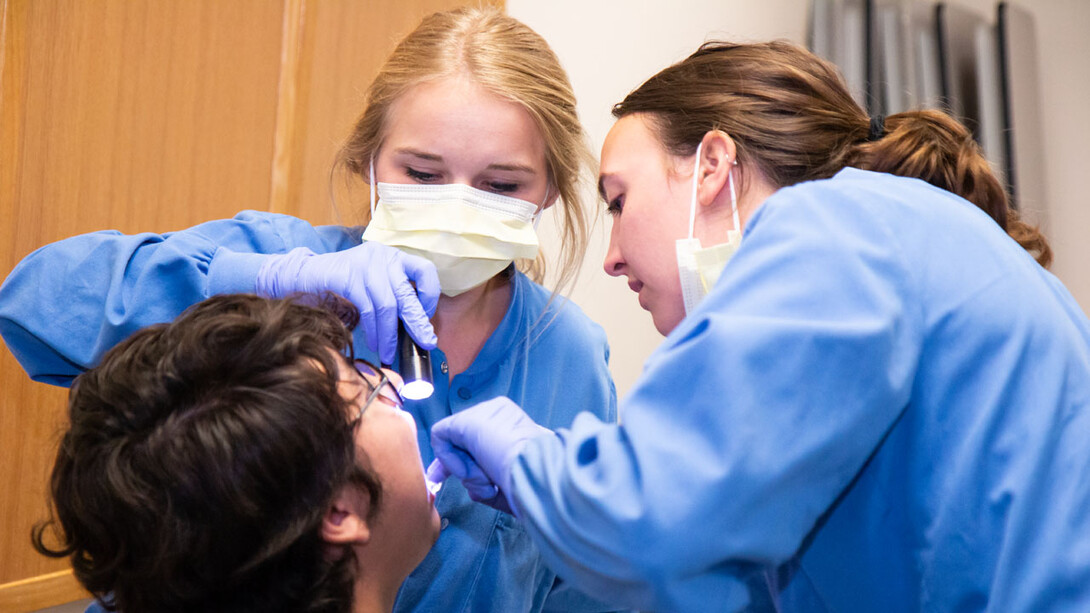
Something to chew on— despite oral disease being mostly preventable, it remains one of the world’s most common illnesses. For many Latino immigrant families, limited access and high cost make dental services prohibitive.
While studies demonstrate that dental appearance and aesthetics have important implications for positive self-esteem, relationships and employment outcomes, perceptions of dental aesthetics held by immigrant families have not been investigated.
A University of Nebraska research project aims to find out more, taking a bite out of the perception that good dental health is secondary to general health.
The Layman Award-funded pilot study is designed to identify risk factors, provide educational training and determine whether assessment and treatment models can be tailored for use outside of Nebraska. The project is housed at the Nebraska Center for Research on Children, Youth, Families and Schools.
Cynthia Willis-Esqueda, associate professor of ethnic studies and psychology, is the project’s principal investigator. Mary S. Willis, professor of nutrition and health sciences, is the project co-principal investigator; Lorey Wheeler, CYFS research associate professor, is in charge of data analysis.
The interdisciplinary project also includes non-profit community center partners, an on-site project coordinator, bilingual research translators and a public health service dentist, who will examine perceptions held by Latino immigrants in Lincoln on dental aesthetics, dietary composition and daily dental hygiene.
“We have a team of people from various disciplines, and we each come in with different questions to contribute something unique,” Willis said. “It’s a good, mixed team, and that helps enrich the research.”
Researchers worked with David Brown, professor of oral biology at the University of Nebraska College of Dentistry, as well other UNMC dental faculty and students to collect data from 150 adults at El Centro de las Américas in Lincoln.
With the help of dental students and hygienists, families visited the center and completed questionnaires about diet, hygiene and their perceptions of dental care before receiving a quick dental exam. Anyone needing dental care was referred to local dentists.
Data will be used to design an intervention study for both urban and rural settings in Nebraska to enhance dental health status and oral health literacy among immigrant families. Researchers also aim to provide immigrant communities with information to improve dietary patterns and reduce potential psychological distress that comes from poor dental health.
Willis-Esqueda notes that much of everyday life focuses around the mouth — speech, food and attractiveness, for example. Dental health, she said, is a major indicator of one’s health and vibrancy.
“When you see people with poor dental health, there is a negative perception,” Willis-Esqueda said. “For example, studies have found that certain people sometimes aren’t hired for a job if there’s a negative appearance, so dental health is very important.”
According to research, overall health of Latino immigrants declines after extended time in the United States.
“Because of changes of diet in the United States — such as much more sugar — Latino immigrants’ dental health is impacted,” Willis-Esqueda said. “Coming here without a dental standard, along with changes in diet, can be disastrous for some.”
Willis said Nebraska is one of the new immigrant “gateway states,” with a rapidly growing Latino population. However, research routinely overlooks Midwestern immigrant populations.
“We expect everyone to come into the United States and forget everything they’ve ever learned,” she said. “But culture is a lifelong process. People coming here bring different diets and traditions, and different histories of dental access and prioritization.”
Each year, children die from complications from tooth infections — even in the United States. In some cases, tooth decay can actually affect the brain.
“Most diseases associated with dental health are preventable,” Willis said. “But you cannot arm people with information unless you know the risk factors.”
Both Willis sisters were motivated to research the issue after growing up in Mexico. Their mother eventually lost all of her teeth because she did not have access to dental care as a child.
“This research is meaningful not only because of our personal experiences, but also because it will help us better understand what Latino immigrants are experiencing today,” Willis-Esqueda said. “In the long run, it benefits all of us.”
The team is pursuing additional federal funding to expand research beyond the pilot project.







